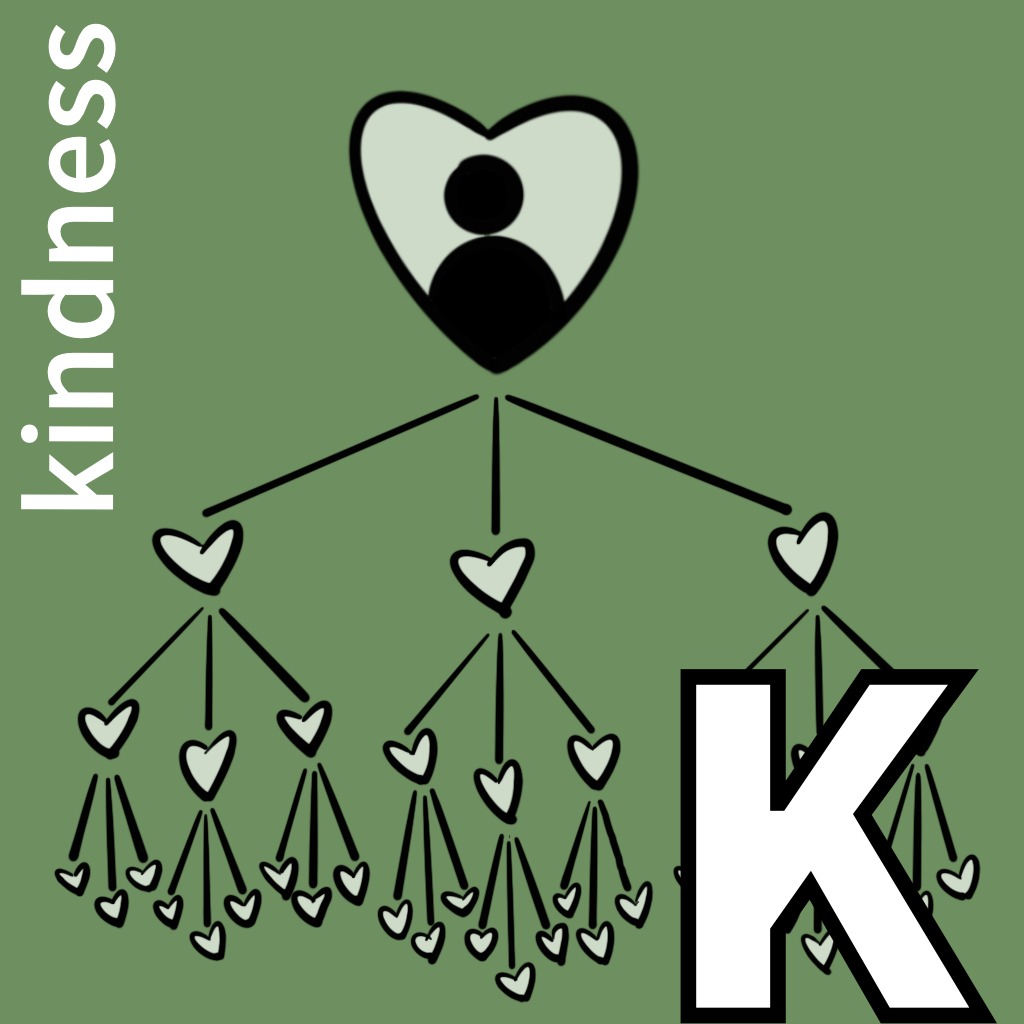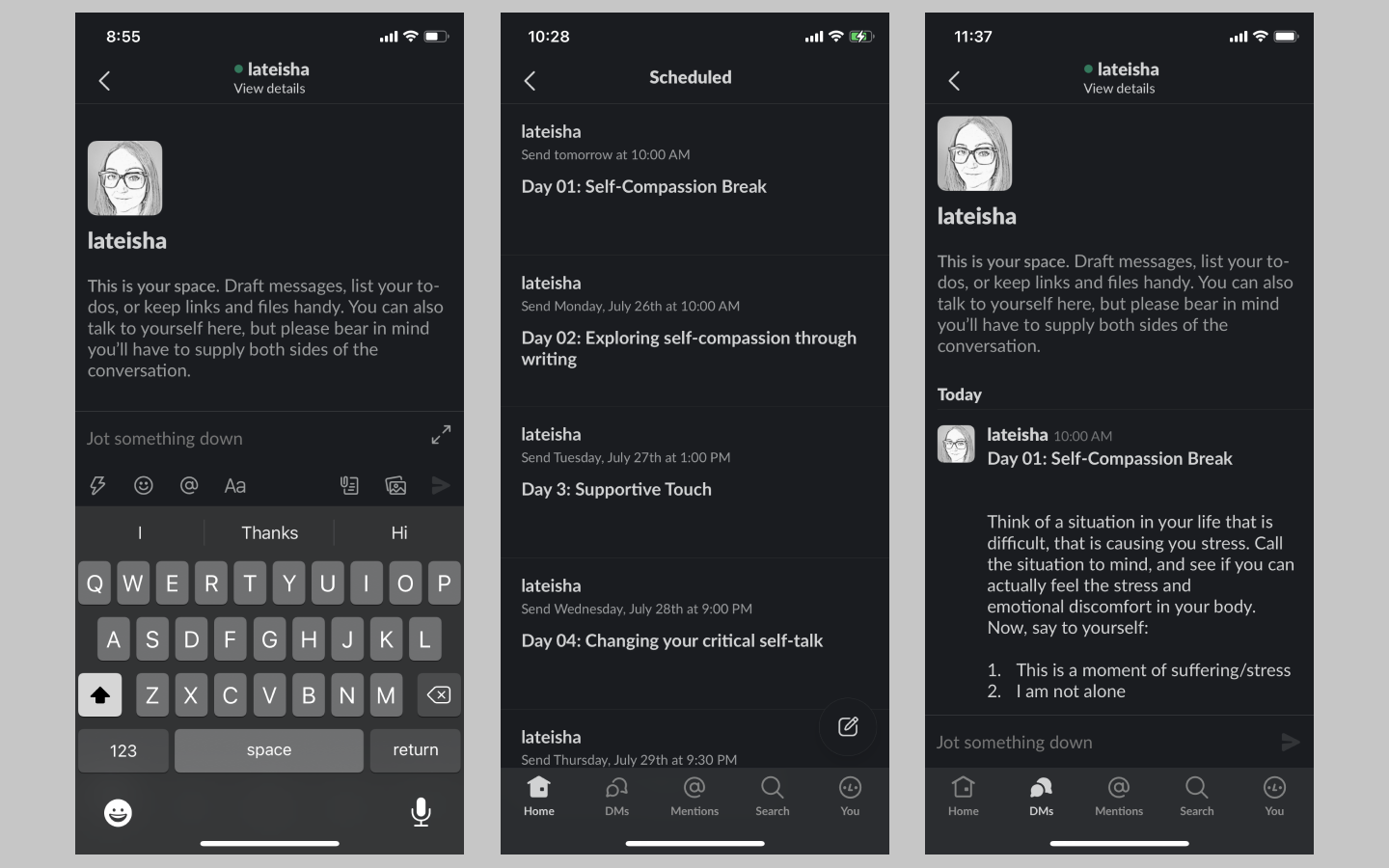ILLUSTRATION
Research refers to the “helper’s high” and how kindness is contagious. There’s a related phenomenon of paying it forward; an internet search surfaced a 2020 film where a kid figures out the exponential power of paying it forward to three people. As I explored kindness, I reflected on the importance of self-kindness. Those ideas informed the first design to show self-kindness and the broader impact on others.
I didn’t love it. My partner thought the design looked like a “puppet master.”

I took a deadline-busting extended break and picking the project back up was difficult. I was disappointed I didn’t finish on time. I was more frustrated that I didn’t complete the project after work settled and vacation passed. Coming back to an image I wasn’t happy with reminded me why I hadn’t finished on time. I wasn’t satisfied with the design.
By taking a break I thought I was practicing self-kindness. Instead of feeling self-compassion, I felt self-criticism. When I began to research why it is challenging for some of us to be kind to ourselves, the simpler illustration emerged.
INSPIRATION
There’s often an unexpectedness that comes from kindness. The phrase “random acts of kindness” reflects that unexpectedness. Ultimately, I do think we expect and want humans to be kind to each other.
I considered changing the word to “kind” to offer more interpretations like prior Alpha Projects’ words. Something resonated around kindness so I kept the word’s focus. The definition narrowed more as I thought about how much simpler it seems to be kind to others. So many art projects and education initiatives center around supporting friends and surprising strangers with kindness. I wondered how my project could celebrate intentional acts of compassion toward ourselves.
Nothing among my brainstormed list of ideas inspired me and that’s when I spiraled. I was already disappointed in my initial illustration. I didn’t feel like I was going to complete a project to the quality level I expected of myself. So I told myself I’d be kind to myself and take a break. This made sense at the time because I also felt burned out from my day job.
And then I went on a much-needed vacation. And then I returned from a too-short vacation. And then I felt overwhelmed by being behind. It was hard to start again knowing I had done work I wasn’t satisfied with so far and feeling pressure to produce something amazing to justify the project’s delay.
CREATION
With my big project at work nearly wrapped up, I began to seriously revisit the project. I wondered why I essentially sabotaged this Alpha Project by choosing an output to address self-kindness instead of kindness towards others.
My curiosity led me to an article on why it’s difficult to practice self-compassion. As I read this passage, I teared up:
Another reason that many people struggle to practice self-compassion, according to [psychologist Rami] Nijjar, is that it can force you to confront memories and events that you might find painful. … This can be especially difficult, says Nijjar, for people who grew up in households where their parents didn’t practice compassion, either to themselves or the people around them. “As humans, we learn about ourselves through relationships. If we’re in families where our parents were struggling to cope, whether that’s through mental illness, addiction, or marginalization, they can project their fears and insecurities to those closest to them. … If you come from an environment where your parents are struggling with self-compassion, you’re more likely to have negative beliefs around your self-worth. When you start practicing self-compassion, you can really come face to face with those aspects of your experience,” says Nijjar.
I hadn’t imagined exploring kindness would take me to that place. I understood other reasons why self-compassion might be personally challenging. I thought I was being kind to myself by taking a break, but I experienced shame around not completing the project on time. I felt an act of self-care was self-indulgent.
Related to shame is a never-ending battle with perfectionism. Generally, Alpha Projects counters perfectionism because a two-week sprint doesn’t allow for true perfection. The stakes felt higher to achieve a more perfect output after the failure of falling so behind. I had to let that go.
Dr. Kristin Neff has defined self-compassion as having three elements: self-kindness, common humanity, and mindfulness. I didn’t end up practicing self-compassion well on this project but it is a skill I can develop. Many of us have the skill of compassion and use it well for others but not ourselves. Practicing self-compassion is the inverse of the Golden Rule.
Compassion means “to suffer together” and self-compassion then means to be with yourself in suffering. But It also means to take action to alleviate it. This gave me inspiration for my project. I could create a skill-building system around being mindful, connected to others, and kind to myself.
To build self-compassion as a skill, I searched for content to develop a personal 30-day self-compassion challenge. I was surprised to find a few existing challenges around this but I wasn’t sure if they were evidence-based or overly woo-woo. I ultimately selected 5 of 8 exercises from self-compassion.org to cycle through over 30 days. I wanted to notify myself to try these exercises at different times depending on the day of the week. Unlike other habits, I’ve developed through behavior design, I felt it was important for me to try the exercises in the morning, afternoon, or night. The variable timing is meant to help me understand that I should be able to take 5 minutes to practice self-compassion when I need it.
I set up a basic Slack workspace for myself many years ago though I don’t use it. I do use Slack at work and for multiple communities. Since I’m used to Slack, I set up a daily self-compassion challenge using the newly added schedule message feature. I took the 5 self-compassion exercises and scheduled a message for each that I repeated over 30 days. I received the first message today. If there’s a day where I can’t take 5 minutes upon notification, I can use the remind feature in Slack to surface it again later that day.

REFLECTION
It’s not easy to publicly share my challenges with self-compassion. It feels embarrassing. And I’m not fully being kind with myself about the project at this moment. I’m thinking that a scheduled self-compassion system isn’t the most brilliant project. But I’ve accepted it’s what I need right now to do better in the future. Perhaps that’s progress?
CONNECTION(S)
For curated links and other content I couldn't fit into this post, subscribe to the email newsletter.
